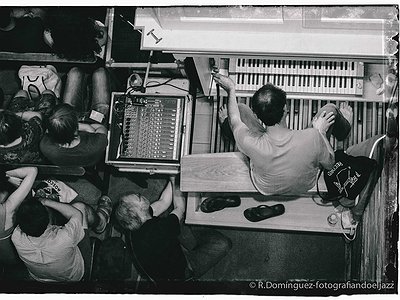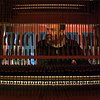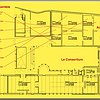Part 2
What do improvisation and composition mean to you and what, to you, are their respective merits?
Two ways to go as far as possible from myself ! To take me outside. Let's go.
How important are practising and instrumental technique for achieving your musical goals ?
Very important, but very far from any academic issues or any virtuosity worries. Let's be an idiot in the tradition.
How do you see the relationship between sound, space and performance?
Space, and spatial organisation of the orchestra are the first element I worry about when I compose. Then I try to deduce the whole form from this first decision, something like a spatial process. (cf. "Juked Organs", "Hearsay Distances", "Points Sans Surface", etc. Not to talk about the sound installations I do with Eric La Casa.)
When I improvise, space is not a parameter but a partner.
Derek Bailey defined improvising as the search for material which is endlessly transformable. Regardless of whether or not you agree with his perspective, what kind of materials have turned to be particularly transformable and stimulating for you?
I feel totally far away from (a stranger to ?) the idea of material. I wrote a text (in French, sorry) to try to explain this ("La Culpabilité Du Matériau" - Culpability of material). In a few words, for many reasons that I try to explain in the text, I can't help thinking that this notion of material has to be connected to the idea that the world has to be available, and in this regard, I can't help thinking that when one does some kind of art, one's goal (among others) should be to show that the world is not available at all !
As many sculptors, I think that the material, (if it exists) is already the piece. The research - if there's research – takes place before. Or, in other words : there's no such a difference between material and a form that some artist would offer or bring to it ...
Means that, even though I understand well what Derek Bailey was trying to say, I think I don't agree at all : In fact, I almost believe the opposite to be true : improvising would be the search for a material that doesn't leave you "free", that leaves you unfree, but pushes you in a place that would be as precise and narrow as possible ! A point ! A line ... a curve or a slope that couldn't be different ? Having to choose means that you made a mistake somewhere before.
John Stevens of the Spontaneous Music Ensemble had two basic rules to playing in his ensemble: (1) If you can't hear another musician, you're playing too loud, and (2) if the music you're producing doesn't regularly relate to what you're hearing others create, why be in the group. What's your perspective on this statement and how, more generally, does playing in a group compare to a solo situation?
More and more I play solo as if I was playing in a group : I am a group and the debate among the group is the music.
More and more I play in a group as if I was doing a solo in a room with a very strange and active background noise.
Playing too loud or to soft doesn't mean anything to me. Music, stage, improvisation, groups, don't have to repeat the supposed politeness of everyday life — it can but it doesn't have to.
I also want to say that my entire life has been structured by the experience of the duet : I work and live a lot with "the other". What is brilliant for me is to feel that this work and life is not mine, not hers, not his, but purely ours ... something like a non-subjective third term unless we consist in one subject, the 2 of us ... For example what I do with Thomas Tilly, or Eric La Casa, or Lotus Edde-Khouri.
Some people see recording improvised music as a problem. Do you?
Not at all, but perhaps I listen to recorded improvisation as field recording : inhabited fields !
In the 20th century, the relationship between music and other forms of art – painting, video art and cinema most importantly - has become increasingly important. How do you see this relationship yourself and in how far, do you feel, does music relate to other senses than hearing alone?
My music is totally informed by my experience in visual art and by my work and collaboration with dance and dancers : Nadir, Hop La ! Nous vivons, Catherine Diverrès, Lotus Edde Khouri. Also, philosophy is always coming with me anywhere I go, like an old friend who will tell me some cruel truth when the situation requires it, but who will also give me some space and air to escape from the narrow window that the stage sometime creates and forces you to look through. Plotin, Vico, Duns Scot, Ray ... Books in my pocket.
In how much, do you feel, are creative decisions shaped by cultural differences – and in how much, vice versa, is the perception of sound influenced by cultural differences?
My musical work and practice were strongly informed by traditional music from everywhere and they still are. That means that I listen to more Turkish music or bagpipes from Bulgaria or the centre of France than to any popular songs from the radio ... pop, rock, folk or whatever : to be honest, I nearly never do. From the beginning, my musical background influences have been culturally varied and diverse.
Do you feel it important that an audience is able to deduct the processes and ideas behind a work purely on the basis of the music? If so, how do you make them transparent?
For me, this question is the main question. Or, one of the main. I think that the answer to this question is the structure of the process itself. The level of transparency is informing the composition (for example "Hearsay Distances" or "Juked Organs") and/or the way instruments are being played. Of course, there is not one solution. Trying to know and worry about it is the solution.
Usually, it is considered that it is the job of the artist to win over an audience. But listening is also an active, rather than just a passive process. How do you see the role of the listener in the musical communication process?
There is a contradiction between the answer to the previous question and the answer to the present one. The level of transparency has to be taken out of any communication worries. Actually the path is very narrow, but that's what creates an artistic form as a result. Information with no communication.
Also : Music is happening in the act of listening. Even my own music happens when I listen to it, more than in any musical projection that I could have done in advance. Music has to avoid any representation of what music is supposed to be.
Beside that I (of course ?) think that we can have a strong mental listening sensation of a music that doesn't exist yet.








